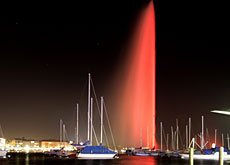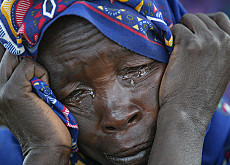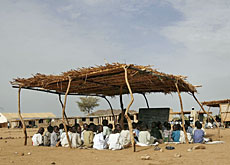Jet d’eau “bleeds” for Darfur

Geneva's landmark Jet d'eau will run red on Tuesday – International Justice Day – to symbolise the ongoing bloodshed and atrocities in Sudan's western Darfur region.
Campaigners and the city authorities want to remind the world of the need to find a solution to a conflict that international experts say has killed more than 200,000 people and displaced millions.
“It won’t change anything on the ground but as a symbol it’s very important that an international city like Geneva states clearly that these massacres and this humanitarian catastrophe are going on,” Philip Grant, president of the Geneva-based justice organisation Trial, told swissinfo.
The initiative, which will see the 140-metre-high fountain bathed in red light after dark, follows an approach by Trial to the city authorities.
Mayor Patrice Mugny said the city, with its strong humanitarian tradition, was sending out a “strong protest” at what was happening in Darfur.
“Time and time again we read about new massacres where hundreds, thousands of people lose their lives,” he said. “Geneva is using this opportunity to say once again that these terrible acts have to stop.”
Mahor Chiche, president of the Paris-based Save Darfur campaign, added that maintaining diplomatic and public pressure was crucial as the Sudanese government was sensitive to outside criticism.
He said Switzerland, whose president Micheline Calmy-Rey visited a camp in Chad at the weekend holding thousands of Darfur refugees, had a role to play in finding a solution to the conflict.
Pursuit of justice
Trial is also keen to maintain pressure on the Sudanese government to cooperate with the International Criminal Court (ICC), based in The Hague in the Netherlands.
The ICC has issued arrest warrants for two men suspected of war crimes – one of them Sudan’s humanitarian affairs minister – but the government has refused to recognise the court’s jurisdiction.
Last week Trial urged the UN Human Rights Committee, which is sitting in Geneva, to remind Sudan of its obligations under international treaties.
“We want to see effective international justice and ensure that further crimes are not committed,” said Grant.
Trial added that it would shortly begin working with Darfur victims in Switzerland to help them bring cases before the ICC and to obtain compensation.
Libya talks
Geneva’s attempt to highlight the suffering comes as international mediators completed two days of talks in Libya to discuss progress on ending the conflict.
UN peace envoy Jan Eliasson was joined in Tripoli by envoys from the United States, the European Union, the African Union and China.
The mediators have been criticised for a lack of progress in bringing rebel groups to talks. They split into more than a dozen armed groups after an unpopular peace deal last year with Khartoum that only one of them signed.
Rebel factions that did not sign the accord have now been invited to attend talks in Tanzania next month.
As the Tripoli meeting wrapped up on Monday, Eliasson said he thought he could now see “light at the end of the tunnel”.
swissinfo, Adam Beaumont with agencies
International experts say more than 200,000 people have died and 2.5 million have been displaced in the Darfur region since 2003, when ethnic African rebels took up arms against the Arab-dominated Sudanese government, accusing it of decades of neglect.
Sudan’s government is accused of retaliating by unleashing a militia of Arab nomads known as the janjaweed – a charge it denies.
A peace agreement signed a year ago between Sudanese President Omar al-Bashir’s government and one rebel group in Darfur has been ineffective because more than a dozen other rebel factions rejected the deal and are still fighting.
Sudan said on Sunday that it had reservations about the mandate given to a 26,000-strong United Nations-African Union force for Darfur under a draft UN Security Council resolution circulated on Wednesday.
After months of talks, threats and negotiations, Khartoum finally agreed to the force to bolster 7,000 struggling AU troops and police who have failed to stem the violence.
The draft resolution said the joint force was “authorised to use all necessary means” and was to be deployed under Chapter VII of the UN Charter, which would give the troops authority to use force to protect the millions of civilians under threat in Sudan’s remote west.

In compliance with the JTI standards
More: SWI swissinfo.ch certified by the Journalism Trust Initiative


You can find an overview of ongoing debates with our journalists here. Please join us!
If you want to start a conversation about a topic raised in this article or want to report factual errors, email us at english@swissinfo.ch.